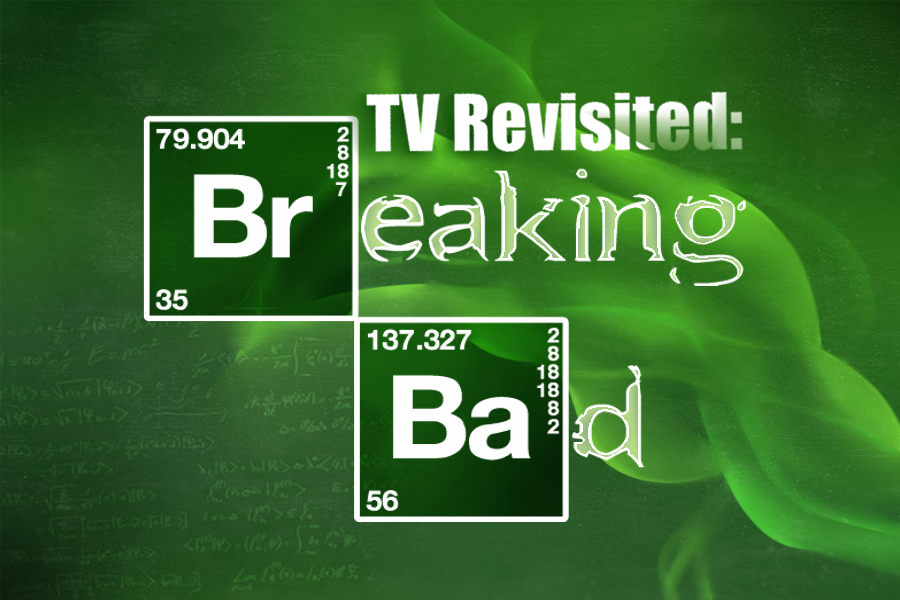
Get your baby-blue meth and popcorn ready; we’re cooking Breaking Bad again
(Editor’s note: This article contains spoilers.)
My dad never watched Breaking Bad, and his reasoning was surprisingly poignant — the concept of a dying teacher turned bad was his worst nightmare. Indeed, a show about the absurdly creepy scenario of a lower middle-class suburban New Mexican family hit way too close to home. Breaking Bad turned an awkward character like the dad from “Malcolm in the Middle” into “the one who knocks.”
Breaking Bad has left its mark beyond the dramatic 2013 finale, and it was rightfully deemed one of the best televison series of all time — earning the awards to prove it. As an avid fan and former binge-watcher of the show, I, prompted by that week-too-long winter break, decided to rewatch the show. Rewatching all five seasons (I’m not lying when I say I’m a binge watcher) brought about new revelations and ideas concerning the masterful show. I gained further appreciation for the main character’s (Walter White, played by Bryan Cranston) complexity and show creator Vince Gilligan’s genius. In case you haven’t watched or finished the series yet, spoiler alert ahead.
After a second look, the extreme use of foreshadowing became blatantly apparent. The episode “Box Cutter,” notably, had a single shot in the opening scene that focused a second too long on a box cutter, and would serve as the clue for the gruesome act that would follow. There are plenty more examples, but their significance stems from Gilligan’s shot-by-shot detail of the show. Each scene is handled with care and contributes to the show’s most important moments, making them all the more dramatic, often without the viewer even noticing. This minor artistic detail is, however, the least of what I overlooked in my initial viewing.
Walter’s wife, Skyler (Anna Gunn), emerged as a much more interesting character than before. I’ll jump on the bandwagon with most viewers’ opinion: Skyler is really annoying. But only at first. She goes through three stages in the show: first, the overprotective, suburban wife, and second, a sympathetic, naive and confused character who is grieving and piecing together the lies of her dying husband.
Her final stage is the most interesting. At this stage, she transforms into a version of Walter. She is manipulative, controlling and brutal. Her full-fledged new persona is especially evident in her request for Walter to kill Jesse Pinkman (Aaron Paul), justifying it as merely “one more” murder. Of course, this could be interpreted as trying to keep herself and her family safe from the dangers of Walt’s meth business. But she is much more powerful and complicated than that. She publically kicks Lydia out of her car wash, she “f****d Ted” out of defiance, she buys a car wash to launder money and, most importantly, when her brother-in-law and DEA officer Hank Schraeder (Dean Norris) gives her a free send-Walt-to-jail card, she keeps quiet.
She protects her husband, even though she was previously “waiting for the cancer to come back” so she could be released as his “slave.” She’s smart, and she proves this throughout the show with her wit and manipulation. She even faked a panic attack in front of a locksmith in order to break into Walter’s apartment. Though simply an annoying character at the start of the show, Skyler proves she is not subservient — she gets to the bottom of things.
And thus my sympathy for her diminished by the end of the show. As much as she would not admit it, she consciously involved herself in the meth business, beyond the basic purpose of survival. She is not a “slave” to her husband. Instead, she knowingly becomes the right-hand woman of a meth dealer, and had an oddly interesting development in the process.
Walter White had similarly interesting character developments. At first, viewers are sympathetic with Walter — he is a dying high school chemistry teacher with little to his name. While that sympathy remains dominant in the first couple of seasons, by the end, all sympathy has vanished: he is a drug dealer, a murderer, and will go to any lengths to manipulate others for his benefit. Especially noteworthy is his relationship with Jesse, who he claims is “like family.” That may be so, but he nonetheless destroys everything Jesse holds dear, taking advantage of his underlying innocence.
Each of his actions are seemingly for the benefit of Jesse, yet they turn out to be a ploy in the grand scheme of Walt’s plans. While Walt is complicated, my disgust for him as a character is unwavering. I might add, however, that though Walt is a horrible person, he ends up a scared man who, as Skyler puts it, “is way in over his head.” He is not Tuco. He is not Krazy 8. He is not Gus Fring. He is a chemistry genius who was at the right place at the right time and who managed to pull off his Drug Lord facade well.
He is undoubtedly smart, but simply being book-smart does not make one cut out for such endeavors. Walt knows this, and he despises it. There appears to be an internal struggle with Walt as he battles his own capabilities, desires, fate and free will.
While he can pose and slide by as much as he does, he is still chained to his inevitable death in the finale. No matter the degree and multitude of his accomplishments, there is no avoiding this conclusion. That is why the finale is so perfect — he has to die. It was destined from the moment he was diagnosed with terminal lung cancer. Even though he could create a brand for himself and his scientific genius, he is a simple, cowardly man who cannot escape death.
Written by: Caroline Rutten — arts@theaggie.org



